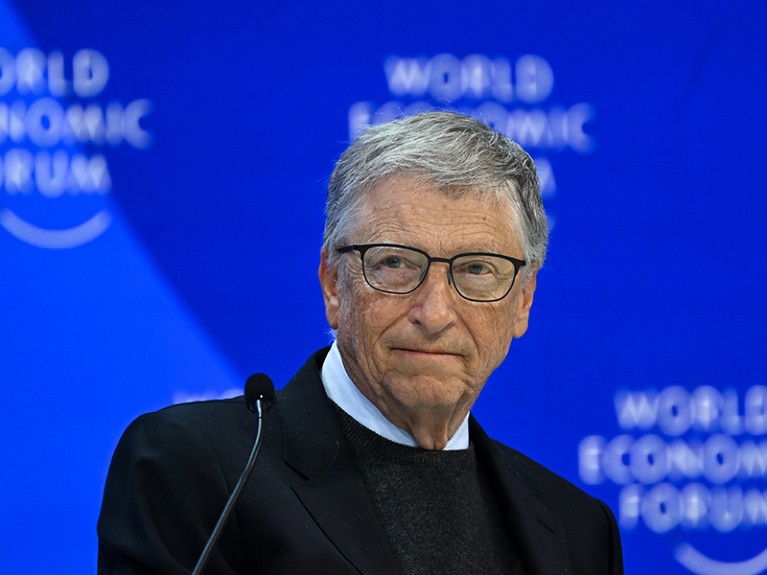
Invoice Gates and different rich people who spend huge sums on analysis usually again some varieties of answer over others.Credit score: Halil Sagirkaya/Anadolu/Getty
The Invoice Gates Drawback: Reckoning with the Fable of the Good Billionaire Tim Schwab Metropolitan Books (2023)
International wealth, energy and privilege are more and more concentrated within the fingers of some hyper-billionaires. Some, together with Microsoft founder Invoice Gates, come throughout as beneficiant philanthropists. However, as investigative journalist Tim Schwab exhibits in his newest e book, charitable foundations led by billionaires that direct huge quantities of cash in direction of a slim vary of selective ‘options’ would possibly worsen world well being and different societal points as a lot as they may alleviate them.
In The Invoice Gates Drawback, Schwab explores this concern compellingly with a concentrate on Gates, who co-founded the expertise large Microsoft in 1975 and arrange the William H. Gates Basis (now the Invoice & Melinda Gates Basis) in 1994. The inspiration spends billions of {dollars} every year (US$7 billion in 2022) on world initiatives aimed toward a spread of challenges, from enhancing well being outcomes to decreasing poverty — with pledges totalling nearly $80 billion since its inception.
Schwab provides a counterpoint to the prevailing standard narrative, declaring how a lot of the ostensible generosity of philanthropists is successfully underwritten by taxpayers. In the USA, for instance, 100,000 non-public foundations collectively management near $1 trillion in belongings. But as much as three-quarters of those funds are offset towards tax. US legal guidelines additionally require solely sparse scrutiny of how charities spend this cash.
CRISPR-edited crops break new floor in Africa
Had that tax been retained, Schwab causes, the federal government may need invested it in additional numerous and accountable methods. As a substitute, the dispersal of those funds is being pushed primarily by the private pursuits of a handful of super-rich people. By entrenching specific pathways and sidelining others, philanthropy is limiting progress in direction of the worldwide Sustainable Improvement Objectives by limiting choices (see additionally strings.org.uk).
Many Gates basis programmes are formed and evaluated utilizing knowledge from the US Institute for Well being Metrics and Analysis (IHME), which was based — and is lavishly funded — by the inspiration. Schwab means that such preparations might be thought-about conflicts of curiosity, as a result of in-house ‘evaluations’ usually are likely to justify present initiatives. Within the case of malaria, as an example, the numbers of mattress nets distributed in tropical international locations — a metric tracked by the IHME — can change into a proxy for lives saved. Such circularity dangers exaggerating the effectivity of programmes that goal to deal with high-profile illnesses, together with HIV/AIDS, probably on the expense of different treatable circumstances for which options would possibly stay unexplored (see additionally Philip Stevens’s 2008 e book Combating the Ailments of Poverty).
Restricted scope
Equally restricted views exist in different areas, too. Within the vitality sector, as an example, Gates flouts comparative efficiency developments to again exorbitantly costly nuclear energy as an alternative of rather more inexpensive, dependable and quickly enhancing renewable sources and vitality storage. In agriculture, grants are likely to help corporate-controlled gene-modification programmes as an alternative of selling farmer-driven ecological farming, using open-source seeds or land reform. African experience in lots of domestically tailored staples is sidelined in favour of some supposedly optimized transnational commodity crops.
Moreover, the Gates basis’s help for therapies that supply one of the best probabilities of accumulating returns on mental property dangers eclipsing the event of preventive public-health options, Schwab notes. For instance, the inspiration promotes contraceptive implants that management ladies’s fertility, as an alternative of strategies that empower ladies to take management over their very own our bodies. Equally, the inspiration usually backs for-profit, Web-based training methods moderately than teacher-led initiatives which might be guided by native communities.
All through its historical past, the Gates basis’s emphasis on ‘accelerating’ improvements and ‘scaling up’ applied sciences, as famous on its web site (gatesfoundation.org), obscures real-world uncertainties and complexities, and ignores the prices of misplaced alternatives. For instance, Gates’s goal to eradicate polio is laudable. However pharma-based actions are sluggish — and may come on the expense of sensible options for much less ‘glamorous’ but critical scourges, resembling soiled water, air air pollution or poor housing circumstances.

Transparency is scarce on whether or not charitable investments in vaccine corporations would possibly profit philanthropists or their contacts.Credit score: Simon Maina/AFP/Getty
Thus, by selling interventions related to the technological processes of extraction, focus and accumulation that underpinned his personal company success, Gates helps to tilt the taking part in subject. His basis tends to neglect methods constructed on financial redistribution, institutional reform, cultural change or democratic renewal. But in areas resembling public well being, catastrophe resilience and training, respect for numerous methods, multifaceted views, collective motion and open accountability might be simpler than the kind of technology-intensive, profit-oriented, aggressive individualism that Gates favours.
Schwab traces the origins of this ‘Gates downside’ to the Nineteen Nineties. At the moment, he writes, Gates confronted hearings within the US Congress that challenged anti-competitive practices at Microsoft and was lampooned as a “monopoly nerd” within the animated sitcom The Simpsons for his proclivity to purchase out opponents. By establishing the Gates basis, he pulled off an enormous communications coup — rebranding himself from an archetypal acquisitive capitalist to an iconic planetary saviour by selling tales of the inspiration’s optimistic affect within the media.
Genetic modification can enhance crop yields — however cease overselling it
But since then, Schwab exhibits, Gates has pursued a charitable monopoly much like the one he constructed within the company world. He has proven that in philanthropy — simply as in enterprise — concentrated energy can manufacture ‘success’ by skewing information protection, absorbing friends and neutralizing oversight. As an illustration, Schwab paperwork how the voices of some non-governmental organizations, academia and information media have been muted as a result of they rely upon Gates’s cash. Whereas dismissing “unhinged conspiracy theories” about Gates, he describes a phenomenon that involved activists and researchers name the “Invoice chill”. By micromanaging analysis and dictating strategies of research, the inspiration successfully forces scientists to go down one path — in direction of the outcomes and conclusions that the charity would possibly desire.
These points are exacerbated by Gates making use of the identical vitality that he utilized in enterprise to coax big sums from different superstar donors, which additional concentrates the sorts of innovation that profit from such funding. However Schwab has discovered that transparency is scarce on whether or not or how Gates’s non-public investments or these of his contacts would possibly profit from his philanthropy. Questions come up over the presence of individuals with private ties to Gates or the inspiration on the board of start-up corporations funded by the charity, for instance.
Larger image
One minor gripe with the e book is that though Schwab excels in forensically recounting the particular circumstances of Gates’s charitable empire, he’s much less clear on the broader political forces at work or the choice instructions for transformation which were probably missed. Schwab usually implies that Gates’s altruism is insincere and rightly critiques the entrepreneur’s self-serving “colonial mindset” (see, for instance, S. Arora and A. Stirling Environ. Innov. Soc. Transit. 48, 100733; 2023). However on this, Gates is a product of his circumstances. As Schwab writes, “the world wants Invoice Gates’s cash. Nevertheless it doesn’t want Invoice Gates”. But perhaps the actual downside lies much less within the man than within the circumstances that produced him. An identical ‘tech bro’ might simply change Gates.
The challenges dealing with scientists within the elimination of malaria
Maybe what’s most at situation right here just isn’t the romanticized intentions of a specific particular person, however the normal lack of recognition for extra distributed and collective political company. And greater than any single individual’s overblown ego, maybe it’s the world forces of appropriation, extraction and accumulation that drive the present hyper-billionaire surge that have to be curbed (see additionally A. Stirling Power Res. Soc. Sci. 58, 101239; 2019).
Decision of the Invoice Gates downside would possibly want a cultural transformation. Emphasis on equality, as an example, might be extra enabling than billionaire-inspired idealizations of superiority. Respect for variety is likely to be preferable to philanthropic monopolies that dictate which choices and values depend. Precautionary humility will be extra invaluable than science-based technocratic hubris about ‘what works’. Flourishing might function a greater guiding goal than corporate-shaped obsessions with development. Caring actions in direction of fellow beings and Earth will be extra progressive than urges to regulate. In that case, Schwab’s wonderful exposé of hyper-billionaire ‘myths’ might but assist to catalyse political murmurations in direction of these extra collective ends.




